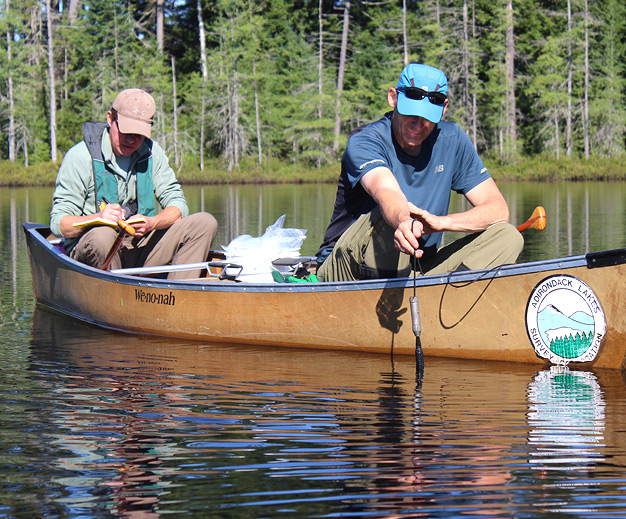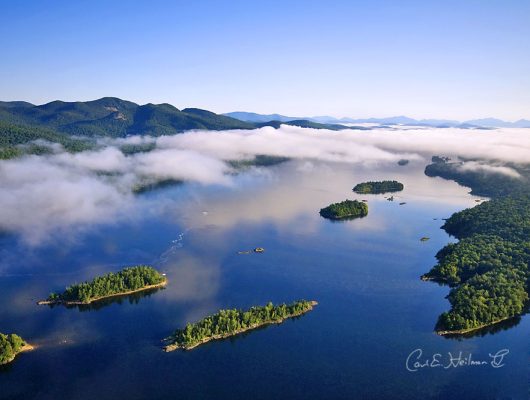By Zachary Tarrant – Legislative Intern
Friday, August 1, 2025
In June, both houses of the New York State legislature passed the Open Water Data Act (S.1211-A/A.5254-A). This legislation, sponsored by Senator Rachel May and Assemblymember Anna Kelles, Ph D, is modeled after successful policies in water-scarce Western states. It will bring together scientists and state and local agencies to identify key water data, information, and tools needed to support the efficient and transparent long-range planning and management of New York’s freshwater resources. The Adirondack Council was proud to advocate for the successful passage of the bill this year.
 Data on water quality, ecology, and infrastructure collected from wetlands, lakes, rivers, streams, aquifers, and private wells will be included in this effort. Agencies will develop common standards for data collection and dissemination that will be mandatory for projects receiving state funding. They will also develop a framework to incorporate data from citizen scientists. Ultimately, all water data will be made accessible to the public via the state’s OpenNY data sharing platform. The Open Water Data Act helps advance the Adirondack Council’s call in VISION 2050 to establish a shared research agenda for the Adirondack Park.
Data on water quality, ecology, and infrastructure collected from wetlands, lakes, rivers, streams, aquifers, and private wells will be included in this effort. Agencies will develop common standards for data collection and dissemination that will be mandatory for projects receiving state funding. They will also develop a framework to incorporate data from citizen scientists. Ultimately, all water data will be made accessible to the public via the state’s OpenNY data sharing platform. The Open Water Data Act helps advance the Adirondack Council’s call in VISION 2050 to establish a shared research agenda for the Adirondack Park.
The Adirondacks are home to over 3,000 lakes and ponds and more than 30,000 miles of rivers and streams. These precious ecosystems provide potable water, pristine natural beauty, recreation and tourism opportunities, and economic vitality to communities large and small. These resources are under threat from broad deregulation and massive budget cuts at the federal level, heightened water scarcity resulting from climate change, and risks posed by a wide array of contaminants—from PFAS and microplastics to nitrogen and road salt. Collecting and sharing high-quality data is critical to safeguarding clean water and human health. We cannot adequately protect what we do not fully understand.
The Open Water Data Act will proactively modernize and standardize the water data needed to inform the priorities and decision-making of key actors in the Adirondacks and beyond. The Adirondack Park Agency (APA), the Department of Environmental Conservation (DEC), and policymakers in Albany all rely on high-quality data when drafting and considering regulations and legislation that impact our state’s freshwater resources. Such data also aid the advocacy of the Adirondack Council and other environmental watchdogs. When lobbying for funding and policies to protect clean water, it is often hard data that sways lawmakers.
Existing programs funded by New York State will benefit from having their data made widely available through the OpenNY platform. Over the past four years and owing to the advocacy of the Adirondack Council and partners, the state has allocated $6.5 million to SCALE, a Survey of Climate and Adirondack Lake Ecosystems. Through scientific monitoring, SCALE seeks to track how carbon cycling, dissolved oxygen, harmful algal blooms, and lake ecosystems as a whole respond to climate change. The data gathered through SCALE and published in a centralized database will support scientists and policymakers in understanding how freshwater lakes both can mitigate and adapt to the impacts of climate change.
Similarly, the inclusion of standardized data from citizen scientists will efficiently leverage the expertise of locals, including the Adirondack Park’s many lake associations. Each year, the Citizens Statewide Lake Assessment Program (CSLAP) involves more than 400 volunteers collecting biweekly water data on water chemistry at over 180 sites statewide from June through September. While DEC provides training, materials, and equipment, it is the citizen volunteers from New York State Federation of Lake Association (NYSFOLA) associations who are out gathering samples all summer long. Incorporating standardized data from CSLAP and similar programs is necessary to create a truly comprehensive water database.
Each year, the Citizens Statewide Lake Assessment Program (CSLAP) involves more than 400 volunteers collecting biweekly water data on water chemistry at over 180 sites statewide from June through September. While DEC provides training, materials, and equipment, it is the citizen volunteers from New York State Federation of Lake Association (NYSFOLA) associations who are out gathering samples all summer long. Incorporating standardized data from CSLAP and similar programs is necessary to create a truly comprehensive water database.
As the federal government walks away from its responsibility to protect clean water in the face of the climate and biodiversity crises, it is incumbent upon New York state to steward our freshwater resources. With the President’s proposed budget cutting EPA funding in half and recent Supreme Court cases eroding federal protections for clean water, the Open Water Data Act is an essential piece of New York’s response. Good data is the cornerstone of good policy. We need both now more than ever.

